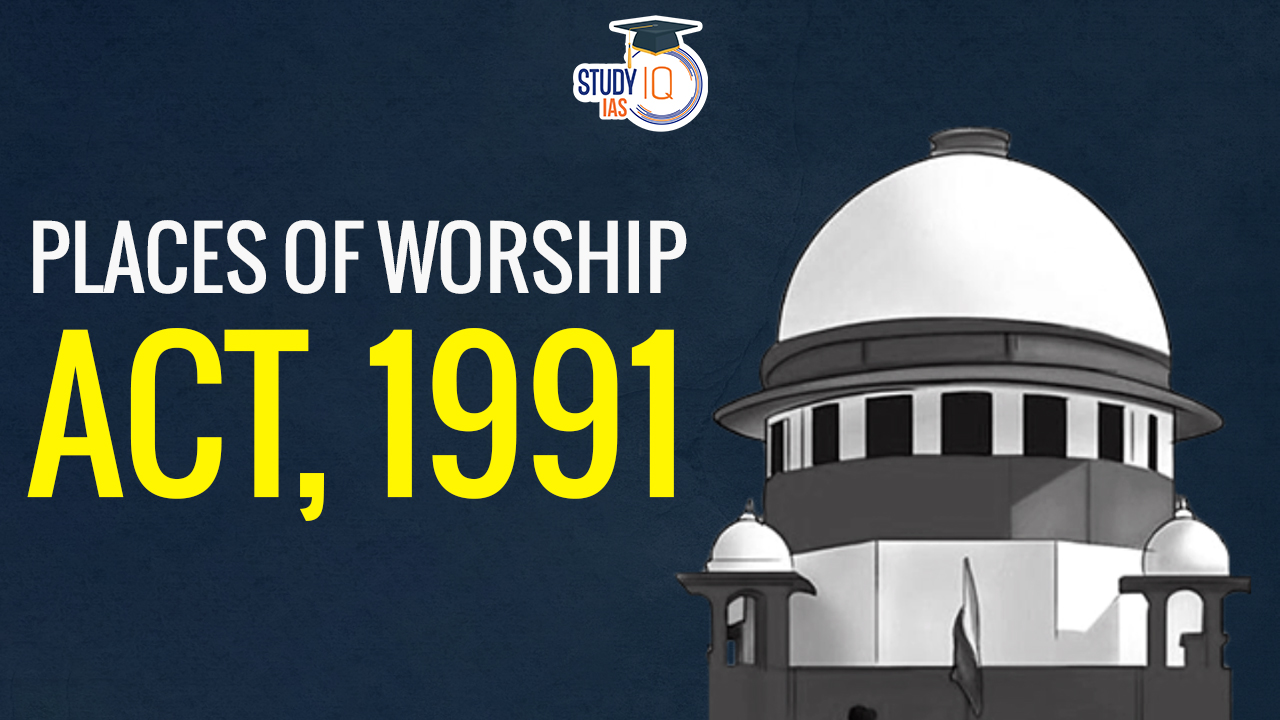Table of Contents
Context
- Typically, excavations at historic sites are conducted by archaeologists or historians to uncover evidence of lost civilizations, ancient cities, or mythological events.
- In India, excavations have been conducted under places of worship of one religion to seek evidence of another religion’s historical presence.
- Such actions have raised questions about secularism and legality, especially in cases like the Gyanvapi Mosque survey.
- The 16th Century Jama Masjid in Sambhal, Uttar Pradesh, has recently become the center of a dispute claiming it was built on the site of an ancient Hari Har Mandir.
Key Directions Issued by the Supreme Court
- Restriction on New Suits: Civil courts across India are barred from:
- Registering new suits challenging the ownership or title of any place of worship.
- Ordering surveys of disputed religious sites.
- Impact on Pending Cases:
- Courts cannot pass any effective interim or final orders in pending suits.
- Includes halting surveys or other investigative actions until further notice.
| Historical Background of the Jama Masjid |
|
Places of Worship Act, 1991
The Places of Worship Act was implemented to preserve the established status of religious places of worship as of August 15, 1947. This legislation prohibits the conversion of any place of worship and is designed to safeguard the religious character of such locations, ensuring their maintenance in their original form. The Government of India enacted Places of Worship Act, 1991 to maintain communal harmony by preserving the religious character of places of worship.
Major Provisions of Places of Worship Act
Key Provisions of the Places of Worship Act:
- Status of Religious Places (Section 4): The religious character of any place of worship existing on August 15, 1947, shall remain unchanged.
- No legal proceedings can challenge the religious character of such places as it stood on that date.
- Exception: The Act does not apply to the Ram Janmabhoomi-Babri Masjid dispute, which was ongoing at the time of its enactment.
- Prohibition of Conversion (Section 3): Conversion of a place of worship or any part thereof from one religious denomination to another or from one religious group to another is prohibited.
- Penalties for Violation (Section 6): Violators attempting to alter the status of a religious site can face imprisonment of up to 3 years and/or a fine.
- Scope of Application: The Act applies to all religious places in India, except those specifically exempted by the government or related to ongoing disputes as of 1991.
Validity of Places of Worship Act
- The Places of Worship (Special Provisions) Act, 1991 is still operational, despite challenges to its constitutional validity. The Act states that the nature of all places of worship, except the Ram Janmabhoomi–Babri Masjid in Ayodhya, shall be maintained as it was on August 15, 1947.
- The Supreme Court views the Places of Worship Act as a legislative intervention that upholds the commitment to secularism. The Act enforces the constitutional obligation of the State to ensure equality among all religions.
- The Act allows for the conversion of a place of worship from one religious denomination to another. It applies to ancient and historical monuments covered by the Ancient Monuments and Archaeological Sites and Remains Act, 1958.
- The Act states that whoever contravenes the provisions of section 3 shall be punishable with imprisonment for a term which may extend to three years and shall also be liable to fine.
Challenges to the Places of Worship Act
- Multiple petitions have been filed challenging the Act, arguing it restricts the right to judicial remedies and violates Article 25 (freedom of religion) and Article 26 (right to manage religious affairs). The Supreme Court is yet to decide on the constitutionality of the Act.
- Justice D.Y. Chandrachud’s 2022 observation: Determining a site’s religious character may not violate the Act’s provisions.
- Prominent Disputed Sites:
- Gyanvapi Mosque (Varanasi)
- Eidgah Masjid (Mathura)
- Kamal-Maula Masjid (Dhar)
- Atala Mosque (Jaunpur)
- Quwwat-ul-Islam Mosque (Delhi)
- Ajmer Sharif Dargah
- Shahi Jama Masjid (Sambhal)
Judicial Observations and Misinterpretations
- In 2022, CJI Chandrachud remarked that “a survey may not necessarily fall foul of the Places of Worship Act” during the Gyanvapi mosque case hearing.
- This oral observation has been misinterpreted by lower courts, leading to orders for surveys of mosques in Uttar Pradesh.
- Misinterpretation has resulted in violence, as seen in Sambhal, Uttar Pradesh.
- Legally, the religious character of a place of worship as of August 15, 1947, is already established.
- Fresh surveys or excavations are unnecessary and could violate the Act.
- The Act prohibits not only conversions but also attempts to determine religious character afresh.
Broader Implications
The implications of these judicial actions are profound:
- Recent surveys have led to communal tensions and violence in areas like Sambhal, Uttar Pradesh, highlighting fears that such judicial inquiries could reignite historical grievances and lead to unrest.
- Article 26 of the Indian Constitution grants religious denominations the right to manage their own affairs in matters of religion.
- Surveys or excavations in places of worship could infringe upon these rights, raising ethical concerns about judicial interference in religious practices
- Historical remains beneath places of worship, whether Hindu temples, Buddhist viharas, or Jain shrines, are for archaeologists and historians to study, not for rekindling communal tensions.
- Judicial missteps risk fueling false historical narratives and deepening communal divides.
Criticism of Places of Worship Act
- Bar on Judicial Review: Detractors claim the Act’s prohibition on judicial review weakens constitutional checks and balances, diminishing the judiciary’s role in protecting rights.
- Arbitrary Retrospective Cutoff Date: Critics highlight the Act’s reliance on an arbitrary date, Independence Day in 1947, as problematic. They argue it neglects historical injustices and denies redress for pre-1947 encroachments.
- Violation of the Right to Religion: The Act is accused of encroaching on the religious rights of Hindus, Jains, Buddhists, and Sikhs, hindering their freedom to reclaim and restore places of worship.
- Violation of Secularism: Opponents assert the Act violates secular principles by favouring one community, undermining the equal treatment of religions and contradicting constitutional tenets.
- Exclusion of Ayodhya Dispute: Specific criticism targets the Act’s exclusion of the Ayodhya dispute, raising doubts about consistency and fairness in the treatment of religious sites.
- Supreme Court’s Stance: The Supreme Court sees the Act as a legislative intervention upholding secularism, ensuring equality among religions and preserving places of worship for all communities.
Way Forward
Addressing the raised criticisms and shortcomings necessitates a comprehensive review of the Places of Worship Act. It is imperative to ensure that the Act does not impede judicial review, preserving the judiciary’s pivotal role in upholding constitutional rights. Striking a balance between preserving the religious character of places of worship and respecting the rights of different communities is crucial. To foster transparency and fairness, public consultation should be undertaken, and specific sites’ exclusion should be revisited to ensure consistency and equitable treatment.


 National Judicial Appointments Commissio...
National Judicial Appointments Commissio...
 Draft Digital Personal Data Protection R...
Draft Digital Personal Data Protection R...
 Bulldozer Justice, Issues and Justificat...
Bulldozer Justice, Issues and Justificat...





















